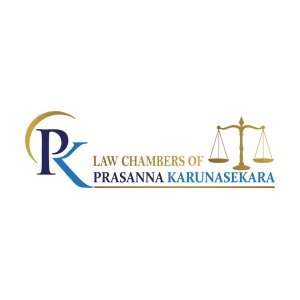Best Real Estate Lawyers in Kiribathgoda
Share your needs with us, get contacted by law firms.
Free. Takes 2 min.
Free Guide to Hiring a Real Estate Lawyer
List of the best lawyers in Kiribathgoda, Sri Lanka
About Real Estate Law in Kiribathgoda, Sri Lanka
The real estate sector in Kiribathgoda, Sri Lanka is governed by several rules and regulations, created to ensure fairness and transparency in property transactions. These laws include the Land Development Ordinance, the Mortgage Act, the Registration of Documents Ordinance, among others. The Registration of Title Act particularly envisages guaranteeing the title of land to facilitate land transactions. Hence, participating in the real estate market - whether as a buyer, a seller, or an investor - requires a sound understanding of the legal complexities involved.
Why You May Need a Lawyer
Hiring a real estate lawyer can be key in situations such as buying or selling a property, disputed land titles, reviewing contracts, understanding tax implications, and navigating zoning issues, among others. A lawyer not only ensures your actions are lawful but also protects your rights and financial interests in complex transactions. They can guide you through unfamiliar legal terminologies and safeguard you from potential risks and ambiguities.
Local Laws Overview
In Kiribathgoda, there are several local laws you should be aware of. The Land Development Ordinance places specific focus on the orderly and planned utilization of land resources. The Mortgage Act provides a framework for mortgage creation and ensures that mortgage deeds are executed properly. The Registration of Documents Ordinance mandates the registration of deeds and documents pertaining to land property. Additionally, certain local zoning laws and covenants may affect property use. Leases exceeding one year need to be notarially executed under Notaries Ordinance.
Frequently Asked Questions
1. Can foreigners own property in Kiribathgoda, Sri Lanka?
Foreigners can own property in Sri Lanka, but land ownership is subject to certain restrictions. It's advised to consult with a real estate lawyer to understand all related laws, including the Land (Restrictions on Alienation) Act.
2. Is it necessary to register a property under my name after purchasing?
Yes, registration of property is crucial after purchase. It validates your ownership and protects your legal rights associated with the property.
3. Can I cancel a property agreement post sealing the contract?
Cancellation of a contract after sealing can have legal implications based on the terms and conditions mentioned in the agreement. It's important to consult with a legal expert before proceeding.
4. Is legal advice necessary while leasing a property?
Yes, having legal assistance while leasing can help in laying out clear lease terms, safeguarding your interests and avoiding possible disputes.
5. Do I have to pay taxes on property in Sri Lanka?
Yes, property owners in Sri Lanka are liable to pay taxes, including the property tax. Consulting a lawyer can help you understand the specifics.
Additional Resources
For further legal assistance, you can reach out to government bodies like the Department of Registrar of Lands and local municipal councils. Also consider consulting authoritative sources like the Sri Lanka Law Reports and the Gazette of the Democratic Socialist Republic of Sri Lanka.
Next Steps
If you need legal assistance, consider contacting a local attorney specializing in real estate law. They can guide you through the legal process and protect your best interests. Remember, it's beneficial to bring all necessary documents related to your case during your initial consultation.
Lawzana helps you find the best lawyers and law firms in Kiribathgoda through a curated and pre-screened list of qualified legal professionals. Our platform offers rankings and detailed profiles of attorneys and law firms, allowing you to compare based on practice areas, including Real Estate, experience, and client feedback.
Each profile includes a description of the firm's areas of practice, client reviews, team members and partners, year of establishment, spoken languages, office locations, contact information, social media presence, and any published articles or resources. Most firms on our platform speak English and are experienced in both local and international legal matters.
Get a quote from top-rated law firms in Kiribathgoda, Sri Lanka — quickly, securely, and without unnecessary hassle.
Disclaimer:
The information provided on this page is for general informational purposes only and does not constitute legal advice. While we strive to ensure the accuracy and relevance of the content, legal information may change over time, and interpretations of the law can vary. You should always consult with a qualified legal professional for advice specific to your situation.
We disclaim all liability for actions taken or not taken based on the content of this page. If you believe any information is incorrect or outdated, please contact us, and we will review and update it where appropriate.
Browse real estate law firms by service in Kiribathgoda, Sri Lanka
Kiribathgoda, Sri Lanka Attorneys in related practice areas.








